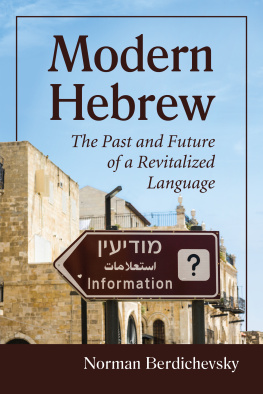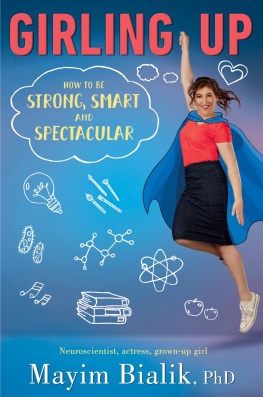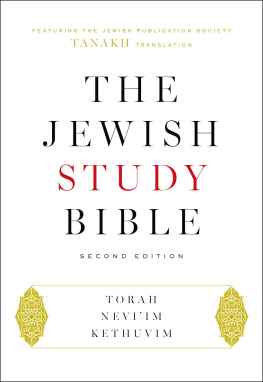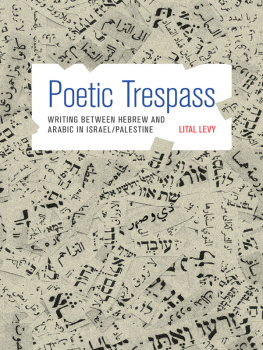HAYIM NAHMAN BIALIK


Hayim Nahman Bialik
Poet of Hebrew

AVNER HOLTZMAN
Translated from the Hebrew by Orr Scharf

Frontispiece: H. N. Bialik. Courtesy of the State of Israel National Photo
Collection, Government Press Office, photograph by Zoltan Kluger, 1923.
Poetry extracts are from Chaim Nachman Bialik: Selected Poems, Bilingual Edition.
Translated by Ruth Nevo. Tel Aviv and Jerusalem: Dvir and Jerusalem Post, 1981.
Copyright 2017 by Avner Holtzman.
All rights reserved.
This book may not be reproduced, in whole or in part, including illustrations,
in any form (beyond that copying permitted by Sections 107 and 108 of the
U.S. Copyright Law and except by reviewers for the public press),
without written permission from the publishers.
Yale University Press books may be purchased in quantity for educational,
business, or promotional use. For information, please e-mail
(U.S. office) or (U.K. office).
Set in Janson type by Integrated Publishing Solutions.
Printed in the United States of America.
ISBN 978-0-300-20066-9 (hardcover : alk. paper)
Library of Congress Control Number: 2016948256
A catalogue record for this book is available from the British Library.
This paper meets the requirements of ANSI/NISO Z39.481992 (Permanence of Paper).
10 9 8 7 6 5 4 3 2 1
CONTENTS

ACKNOWLEDGMENTS

I WOULD like to thank Professor Anita Shapira and Professor Steven Zipperstein, the editors of Jewish Lives, who invited me to contribute a biography of Bialik to this distinguished series. My heartfelt thanks go to both of them also for their comments on the manuscript and their useful suggestions, which helped me find the right tone for telling Bialiks story and providing an accurate account of the historical context of the poets life.
Dr. Orr Scharf translated the manuscript with insight and sensitivity, while paying careful attention to the needs of the English reader. Our dialogue throughout the working process was both productive and enriching. John Knight invested much skill and effort in streamlining the language for an American audience without removing the general sentiment of the book or any of its essential information. Lawrence Kenney copy-edited the manuscript in the most sensitive and meticulous way. I am most grateful to all.
I owe a special thanks to Professor Ruth Nevo for giving her permission to incorporate in this book a few passages from her inspiring translations of Bialiks poetry. Her Selected Poems is probably the most successful of all attempts to render this great poetry into English.
During the books preparation for publication I had the privilege of working with Danielle DOrlando, Erica Hanson, Clare Jones, Margaret Otzel, and Jenya Weinreb at Yale University Press and enjoying the professionalism, dedication, and kindness with which they indulged both author and book. Working with all of them throughout the various stages of production has been both pleasurable and edifying. I extend to them my gratitude and thanks.

Introduction
ISRAEL IS orphaned: Hayim Nahman Bialik is gone. These words, set within a black frame, were blazoned in a headline across the front page of Davar, the leading daily newspaper in Jewish Palestine, on Thursday morning, July 5, 1934. A laconic telegram announcing Bialiks death had been received at the newspapers offices the previous night, just minutes before the issues print deadline, and the editors managed to hastily draft only the headline without any additional information. In the hours and days that followed, the details became clear. Four weeks earlier the sixty-one-year-old poet had left Tel Aviv for Vienna, one of Europes major medical centers, to undergo a prostatectomy at the clinic of a famous specialist. Although the surgery was considered to be routine, no doctor in Palestine dared perform it on Bialik for fear something would go wrong and the surgeon would have to face an intolerable burden of blame and disgrace. The operation was successful, and Bialik appeared to be recovering slowly. Calming reports from Vienna were published in the local press while a nervous public tensely followed the poets condition. But two weeks after the operation a rare complication led to the formation of a blood clot that blocked the coronary arteries and caused a fatal heart attack.
The decision by Davars editors to frame Bialiks death as the loss of a parent was not hyperbolic. It reflected an authentic feeling that his death was a grave national disaster that would be experienced as a personal loss by each and every member of the public. Many compared Bialiks passing to the death of Theodore Herzl, the architect of political Zionism, who had died prematurely on the very same date thirty years earlier. Indeed, for decades the date was commemorated in joint remembrance of the two men, whose careers peaked at the same time, although they never met each other in person. They were branded in the collective psyche as the two pillars of the Jewish national revival: its political leader and its spiritual leader.
In the general literary context, the overwhelming effect of Bialiks death can be compared to the reaction in Russia to the dramatic death of Aleksandr Pushkin a century earlier. Both poets were mourned in a vast number of commemorative poems, such as Mikhail Lermontovs celebrated The Poets Death, as they both were essentially fixed as the national poet.
The conveyance of Bialiks body for burial in Palestine was a lengthy procedure, one carried out as a prolonged funeral procession with multiple stopovers and ceremonies. Twelve days elapsed between his death in Vienna and his interment in Tel Aviv. Memorial services were held by the Jewish community in Vienna before the casket was taken by train to the Italian port city of Trieste. Following a farewell ceremony held by the Italian Jewish community there, it was taken on board the ship Italia, where it was placed in a special cabin bedecked with flags and wreaths and assigned an honor guard of young, Palestine-bound halutzim (pioneers). At Larnaca port in Cyprus another ceremony was held, this one attended by a delegation of dignitaries that came by boat from Tel Aviv and was headed by David Ben-Gurion, the director of the Jewish Agencys political department. The meeting between the members of the delegation and Manya, Bialiks widow, was described in heartfelt words in the Hebrew press. Early on the morning of July 16 the casket was unloaded at Jaffa port and driven through the streets of Tel Aviv for hours, with stops at important landmarks relevant to Bialiks life. At noon a siren sounded mournfully across the city, signaling an all-out cessation of work. Public buildings and schools were draped in black flags. Late in the afternoon the procession arrived at the gates of the Tel Aviv cemetery, located on the citys northern outskirts. Some one hundred thousand people, including a third of Palestines Jewish population, came to bid farewell to Bialik as he was laid to rest. In the days that followed, elaborate commemorative activities began, as new settlements, both rural and urban, city streets, and public and cultural institutions were named after the poet. This was just the beginning of an extensive project of commemoration, one that continues to unfold even to this day.
Next page









